Budyeri kamaru (hello!) from Eora Country,
I hope this message finds you well as we enter another exciting quarter at Media Diversity Australia.
First, I’m thrilled to announce the success of our Media Pathways Program, conducted in collaboration with Western Sydney University. This program has been a game-changer supported generously by the Bennelong Foundation and Multicultural NSW. It involved a four-part seminar series where aspiring journalists from diverse backgrounds had the chance to hone their skills, gain insights, and connect with generous industry members. The culmination of this program will see select participants secure internships in mainstream newsrooms across our media members. We are grateful to our partners and sponsors for their unwavering support in making this initiative successful.
Speaking of success, it was an honour to represent Media Diversity Australia at the Women in Media Conference. I participated in a panel alongside some of the most successful figures in the field of gender equity. Together with Sam Mostyn AO, Kate Jenkins AO, Mary Wooldridge, and Federal Communications Minister Michelle Rowland, we discussed the current shifts and the changes required to advance gender equity in media.
Shifting gears, our NSW Chapter Networking Drinks were so much fun! These gatherings bring together members of our community in a relaxed environment, allowing social and professional connections crucial in connecting with like-minded peers and securing future employment opportunities.
In July, we held a historic inaugural media industry DEI round table, bringing together media heavyweights to commit to a collective path forward to accelerate industry-wide change. You can read our Industry Round Table press release summarising the commitments made at this round table.
Building on this momentum of the round table, we held our first working group meeting last week. We are so pleased with the industry’s appetite to continue collaborating with us to help accelerate change across the industry.
MDA is pleased to welcome two new media members, Junkee Media and ARE Media, into our fold (existing members include ABC, SBS, Seven, Nine, Ten/Paramount, News Corp Australia, AAP, The Guardian, The Daily Aus, The Conversation Group and Private Media Group). Furthermore, we’re on the cusp of launching Memberships with the PR industry at the upcoming PRIA Conference, a significant step in expanding our reach and influence.
For our talented journalists from marginalised backgrounds, remember to sign up for MDA’s TalentHub. It’s your gateway to exciting job opportunities with our member outlets, creating a more equitable media ecosystem.
As we look into the future, keep an eye out for the our panel I am moderating at the inaugural SXSW Sydney event in October, where we’ll continue championing diversity and inclusion in media on a global stage.
Please consider supporting Media Diversity Australia here as we continue to drive industry-wide change.
Happy reading,
— Mariam Veiszadeh (CEO) and the Media Diversity Team
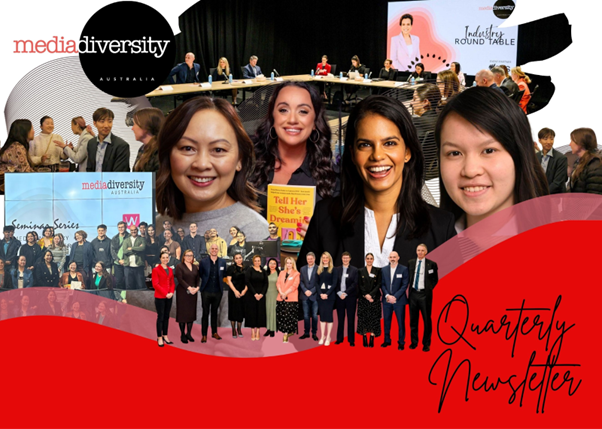
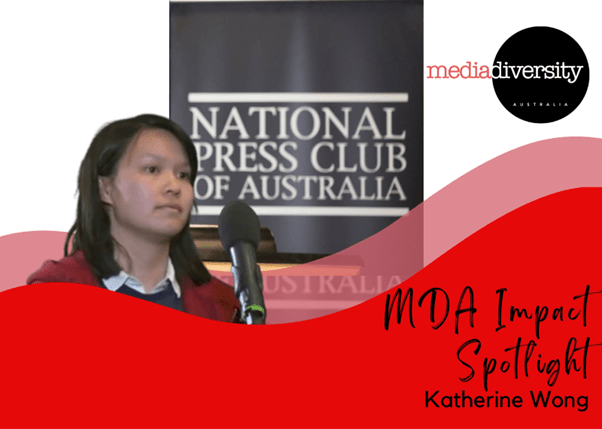
Katherine ‘Kat’ Wong is a recently appointed Press Gallery journalist working for the Australian Associated Press (AAP) in Canberra after serving a cadetship with the media company. After winning Media Diversity Australia’s 2022 Political Fellowship, Kat entered the industry as a passionate and motivated reporter determined to cover the perspectives of diverse young people.
“It was a whirlwind! During the Fellowship, I spent four weeks in Canberra with the SMH and The Age team. I published stories that covered things like Simpsons political memes and Australia’s best author Hugo Award nominee. Then, for the fortnight before the election, I helped out their journos from the Sydney office.
I didn’t get a full-time role immediately, so I spent some time working in publishing, but after a few month, the AAP cadetship rolled around. I applied, and with some advice from MDA’s mentors, I was offered the role. Through AAP’s rotations, I had a little taste of everything from sports reporting to politics to breaking news. Writing many different stories and meeting people from across the news landscape was so much fun. A few months ago, as the cadetship was closing, AAP offered me a full-time job in Canberra Press Gallery, where I am today.”
“I love working at AAP because it is such a lively job. Everyone in the office is lovely, and being a full-time journalist is one of the most fun careers I could ever imagine. I get to do something new every day, whether questioning politicians at press conferences, reporting on the House of Reps, interviewing people who have done cool things with their lives or just having incredible stories. Not to mention, it’s an incredible privilege to have thousands of people read my writing.”
“The best advice is to know that you belong exactly where you are. Being a journalist and telling other people’s stories is an immense privilege that can sometimes feel overwhelming, especially when the industry has indicated that people of colour do not deserve to have their voices heard in the past. And many POC journalists often feel they only have jobs because of a diversity quota or program. But I think it’s important to see those things as levelling the playing field and to know you have worked just as hard other journos, if not harder, to be where you are.”
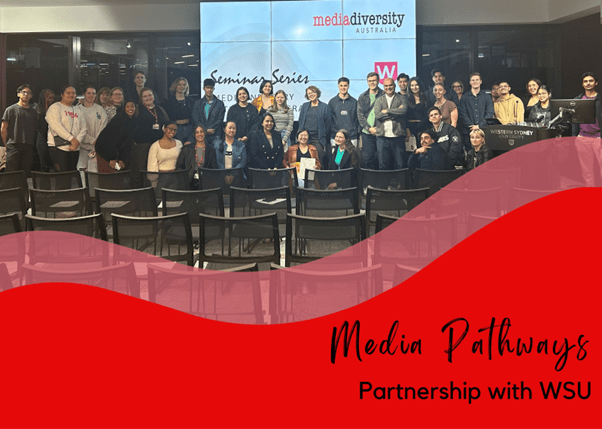
The Media Pathways Program is a dynamic four-part series designed to provide comprehensive support to culturally and linguistically diverse students, graduates, and job seekers in communications, particularly those from refugee and asylum seeker backgrounds.
Supported by the Bennelong Foundation and Multicultural NSW and produced in partnership with Western Sydney University, the program aims to equip participants with the skills, confidence, connections, and experience necessary to thrive in Australian media.
In September, four evening sessions were held at WSU’s Parramatta City Campus, showcasing an impressive line-up of renowned journalists, presenters, and media professionals. Attendees have gained invaluable insights from these accomplished speakers as they share their expertise and experiences.
After completing the seminars, select participants will embark on paid internship placements at News Corp Australia, The Sydney Morning Herald, ARE Media and Mama Mia.
“As someone from a culturally and linguistically diverse (CaLD) background, I’m excited to work with a non-profit like Media Diversity Australia that aims to bring about positive change and ensure that people from diverse backgrounds have equal opportunities in the media industry,” said one participant. “The Media Pathways internship would be a valuable experience as I take the next step in my career and prepare myself to graduate.”
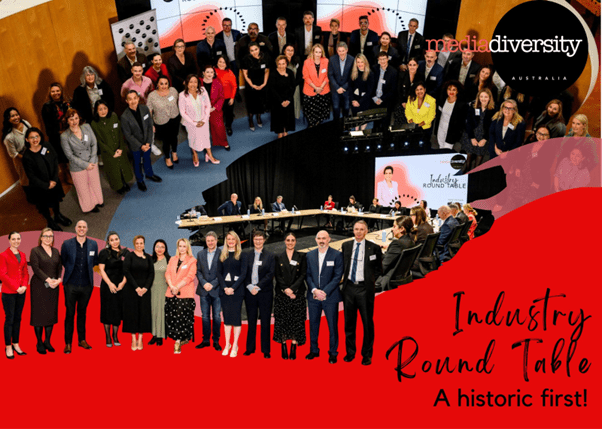
On Friday, July 14, Media Diversity Australia hosted its inaugural industry roundtable in Sydney, bringing together Australia’s media leadership and Federal Communications Minister Michelle Rowland to commit to industry-wide improvement around diversity, equity and inclusion.
The meeting, which was held at SBS, brought together the CEOs, Managing Directors and other senior representatives from MDA member organisations AAP, the ABC, Private Media Group, News Corp Australia, Nine, SBS, Seven, Ten, The Daily Aus, The Conversation Group and The Guardian.
Some notable attendees include Nine’s CEO, Mike Sneesby, Ten’s Executive Vice President, Chief Content Officer & Head of Paramount, Beverley McGarvey, Seven’s Chief People and Culture Officer, Lucinda Gemmell, ABC’s Chief Content Officer, Chris Oliver-Taylor, SBS’s News Director Mandi Wicks and News Corp Australia’s Group Executive, Corporate Affairs, Campbell Reid.
The roundtable provided a platform for an honest and robust initial discussion around barriers to equity and inclusion and opportunities for industry collaboration. The group also started initial discussions around talent pipeline and debated the merits of uniform measurement and tracking of progress across all parts of the industry to ensure greater accountability as an industry.
Building on the roundtable’s momentum, MDA held the first follow-up, working group meeting earlier this month.
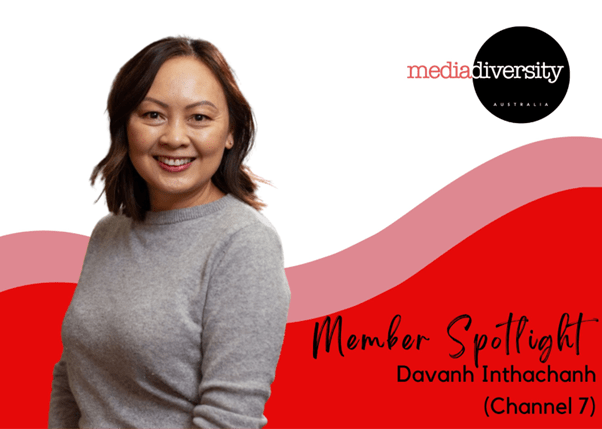
With over 20 years of HR experience, Davanh Inthachanh‘s current role as Channel Seven’s Director of People & Culture sees her responsible for driving change to develop and build a fully engaged and high-performing team.
Under Davanh’s leadership, her team has helped to guide and enhance business performance by implementing initiatives focused on employee engagement performance and development. Davanh is passionate about developing individuals and groups.
You’ve had a fantastic career spanning over 20 years. What have been some highlights for you?
“The most significant career highlights for me have been at Seven and working with our people to shift towards a more inclusive and diverse culture. This is reflected in our team composition and our policies, operations, culture, and overall mindset. We’ve made significant strides in implementing flexibility, encouraging work-life balance, and fostering and celebrating a sense of belonging among our employees, which I believe has tremendously impacted our overall productivity and success.
Seven became the first media company in Australia to be recognised as an Employer of Choice for Gender Equality by The Workplace Gender Equality Agency. The criteria for the citation were rigorous, so this is a significant achievement. Seven also launched its Inaugural Reconciliation Action Plan, cementing Seven’s commitment to strengthen relationships with First Nation employment, embed reconciliation throughout the business and provide Seven with meaningful accountability.”
What strategies can diversity advocates use to create more inclusive and supportive workplaces?
“I believe the key to developing inclusive individuals and teams lies in fostering an environment of respect and mutual understanding. This involves creating safe spaces for open dialogue, ensuring that each person’s voice is heard, and actively promoting continuous learning. Practically, this is about listening to all views across the the organisation. Seven has deployed an employee feedback tool to hear from all people. It also means intentionally creating diverse teams and working groups to share diverse thinking and perspectives. Additionally, a bit of flexibility and adaptability go a long way. There isn’t a one-size-fits-all approach because we understand that everyone’s journey is unique, and we value that diversity and change does take time.”
What outcomes are you most looking forward to from Channel 7’s membership with MDA?
“We look forward to learning from and contributing to this incredible community. We are particularly excited about the opportunities for collaboration, sharing best practices, and gaining insights from other member organisations. We believe in the power of diversity and are keen to leverage our MDA membership to entrance further our understanding and strategies for a diverse and inclusive work environment. Additionally, Seven is looking forward to working with MDA to leverage our partnership and powerful brands to remove barriers to diversity and increase the pipeline of media professionals from diverse backgrounds entering the industry.”
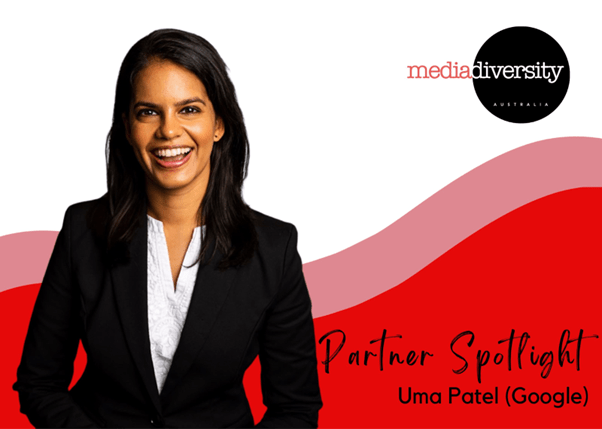
Uma Patel is the Australia and New Zealand Lead for Google News Lab, a team within the Google News Initiative whose mission is to collaborate with journalists to fight misinformation, strengthen diversity, equity and inclusion within news, and support learning and development through digital transformation.
What are Google News Lab’s key priorities?
“News Lab works with newsrooms worldwide to support some exciting projects, that benefit audiences, the new ecosystem and journalists. There are three chief priorities: supporting diversity within newsrooms, growing journalists’ digital skills and partnering with news publishers to tackle misinformation.”
What strengths have you brought to this role as a former working journalist?
“I often think of how difficult my job would be if I weren’t a former journalist. The newsroom is a complex environment – there’s no one way to develop and present a story or convince your editor to publish it. It is incredibly valuable to have had reporting experience when I’m trying to figure out the best strategy to set up impactful partnerships and programs. It helps me instinctively know what’s likely to work well and what’ll be challenging, what the opportunities are and map out projects to capture them. If I had to label the top three skills I took across from my reporting experience, I’d say understanding the newsroom, communications and an ability to react in the moment, on reason instinctively.”
Google News Lab has supported Media Diversity Australia since its inception. How do your strategic objective align with ours?
“We’re proud to have supported from the start; the conversation had barely begun when MDA was founded (I was one of its first members, in my days as a journalist) and now I’d be surprised if there’s a single journalist in the country that isn’t aware of the issue.
The GNI supports a broad range of projects around the world to support the representation of marginalised communities in the news ecosystem. We’re pushing ourselves to build fairness, inclusion and diversity standards into the fabric of every program and partnership we create. MDA’s mission aligns with that endeavour, and we’ve found our partnerships and programs impactful.”
Why is media diversity such an important issue?
“I know from experience how useful it can be to have different experiences and contacts represented in a newsroom, but it can also be difficult to be a woman and person of colour. Audiences, newsrooms and publishers all stand to gain if the stories published come from a broad spectrum of experiences – we can only be fully informed and justify holding people to account if we understand all the angles. MDA does an excellent job of growing and working with newsrooms to do just that.”
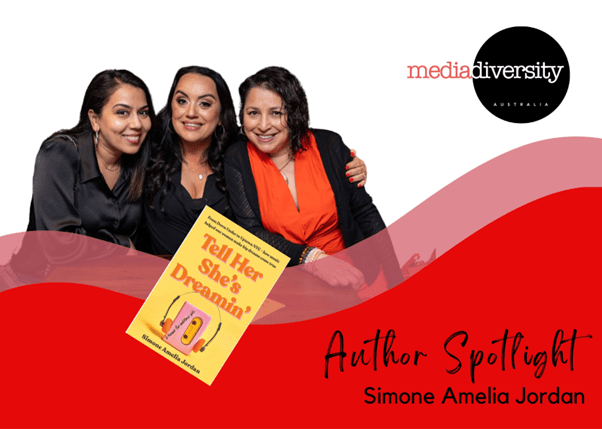
Simone Amelia Jordan (centre) with Mariam Veiszadeh, CEO of Media Diversity Australia (left) and Lena Nahlous, CEO of Diversity Arts Australia (right) at the Tell Her She’s Dreamin’ launch. Credit: Kai Godeck.
We are thrilled to announce the release of Tell Her She’s Dreamin’, the Ritchell Prize-winning debut memoir from MDA’s Director of Special Projects, Simone Amelia Jordan.
Growing up on the whitewashed Central Coast in the 1980s and attending an elite school as a scholarship student from the wrong side of the tracks, Lebanese-Cypriot Simone felt like an outcast among her peers for years. Her lifeline was hip-hop, then in its golden age. Simone recognised the art form’s pro-Black consciousness from girlhood, and the rappers’ resonant words inspired her to embrace her identity and back herself.
From founding Australia’s most successful hip-hop and R&B publication to moving to New York City and interviewing the biggest stars of the time as the editor of the world’s most beloved rap magazine, falling in love and getting her heart broken; grappling with her family ties to culture; and struggling through illness and sexual grooming, Simone’s inspiring story is about defying the odds to reach for your dreams. But it is also about figuring out those dreams can change as you do.
Tell Her She’s Dreamin’ is out now through Hachette Australia. Read an exclusive extract here.
As a not-for-profit organisation, we rely on the help of our incredible volunteers. With your financial and volunteer support, we can continue to run programs to support culturally and linguistically diverse journalists, conduct agenda-setting research, run networking events, provide practical solutions for the media industry, and much more. If you would like to make a tax-deductible donation to support the vital work we do, please click here.
Founded by journalists (Isabel Lo and Antoinette Lattouf) in 2017, Media Diversity Australia (MDA) is a national not-for-profit organisation, working towards creating a media landscape that looks and sounds like Australia. We have expertise in delivering evidence-based research, bespoke programs, strategic memberships and partnerships that disrupt the status quo and pave pathways for diverse representation across Australian media.